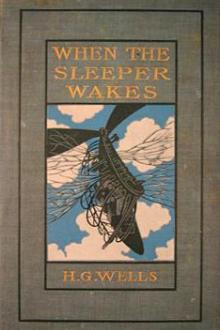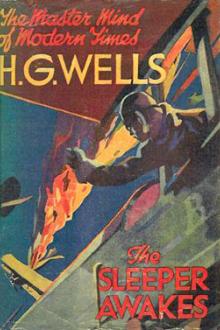The Sleeper Awakes<br />A Revised Edition of When the Sleeper Wakes, H. G. Wells [e novels for free TXT] 📗

- Author: H. G. Wells
Book online «The Sleeper Awakes<br />A Revised Edition of When the Sleeper Wakes, H. G. Wells [e novels for free TXT] 📗». Author H. G. Wells
The gallery they stood upon ran along the upper edge of a huge screen that cut the dancing hall on one side from a sort of outer hall that showed through broad arches the incessant onward rush of the city ways. In this outer hall was a great crowd of less brilliantly dressed people, as numerous almost as those who danced within, the great majority wearing the blue uniform of the Labour Department that was now so familiar to Graham. Too poor to pass the turnstiles to the festival, they were yet unable to keep away from the sound of its seductions. Some of them even had cleared spaces, and were dancing also, fluttering their rags in the air. Some shouted as they danced, jests and odd allusions Graham did not understand. Once someone began whistling the refrain of the revolutionary song, but it seemed as though that beginning was promptly suppressed. The corner was dark and Graham could not see. He turned to the hall again. Above the caryatids were marble busts of men whom that age esteemed great moral emancipators and pioneers; for the most part their names were strange to Graham, though he recognised Grant Allen, Le Gallienne, Nietzsche, Shelley and Goodwin. Great black festoons and eloquent sentiments reinforced the huge inscription that partially defaced the upper end of the dancing place, and asserted that “The Festival of the Awakening” was in progress.
“Myriads are taking holiday or staying from work because of that, quite apart from the labourers who refuse to go back,” said Asano. “These people are always ready for holidays.”
Graham walked to the parapet and stood leaning over, looking down at the dancers. Save for two or three remote whispering couples, who had stolen apart, he and his guide had the gallery to themselves. A warm breath of scent and vitality came up to him. Both men and women below were lightly clad, bare-armed, open-necked, as the universal warmth of the city permitted. The hair of the men was often a mass of effeminate curls, their chins were always shaven, and many of them had flushed or coloured cheeks. Many of the women were very pretty, and all were dressed with elaborate coquetry. As they swept by beneath, he saw ecstatic faces with eyes half closed in pleasure.
“What sort of people are these?” he asked abruptly.
“Workers—prosperous workers. What you would have called the middle class. Independent tradesmen with little separate businesses have vanished long ago, but there are store servers, managers, engineers of a hundred sorts. To-night is a holiday of course, and every dancing place in the city will be crowded, and every place of worship.”
“But—the women?”
“The same. There’s a thousand forms of work for women now. But you had the beginning of the independent working-woman in your days. Most women are independent now. Most of these are married more or less—there are a number of methods of contract—and that gives them more money, and enables them to enjoy themselves.”
“I see,” said Graham, looking at the flushed faces, the flash and swirl of movement, and still thinking of that nightmare of pink helpless limbs. “And these are—mothers.”
“Most of them.”
“The more I see of these things the more complex I find your problems. This, for instance, is a surprise. That news from Paris was a surprise.”
In a little while he spoke again:
“These are mothers. Presently, I suppose, I shall get into the modern way of seeing things. I have old habits of mind clinging about me—habits based, I suppose, on needs that are over and done with. Of course, in our time, a woman was supposed not only to bear children, but to cherish them, to devote herself to them, to educate them—all the essentials of moral and mental education a child owed its mother. Or went without. Quite a number, I admit, went without. Nowadays, clearly, there is no more need for such care than if they were butterflies. I see that! Only there was an ideal—that figure of a grave, patient woman, silently and serenely mistress of a home, mother and maker of men—to love her was a sort of worship—”
He stopped and repeated, “A sort of worship.”
“Ideals change,” said the little man, “as needs change.”
Graham awoke from an instant reverie and Asano repeated his words. Graham’s mind returned to the thing at hand.
“Of course I see the perfect reasonableness of this. Restraint, soberness, the matured thought, the unselfish act, they are necessities of the barbarous state, the life of dangers. Dourness is man’s tribute to unconquered nature. But man has conquered nature now for all practical purposes—his political affairs are managed by Bosses with a black police—and life is joyous.”
He looked at the dancers again. “Joyous,” he said.
“There are weary moments,” said the little officer, reflectively.
“They all look young. Down there I should be visibly the oldest man. And in my own time I should have passed as middle-aged.”
“They are young. There are few old people in this class in the work cities.”
“How is that?”
“Old people’s lives are not so pleasant as they used to be, unless they are rich to hire lovers and helpers. And we have an institution called Euthanasy.”
“Ah! that Euthanasy!” said Graham. “The easy death?”
“The easy death. It is the last pleasure. The Euthanasy Company does it well. People will pay the sum—it is a costly thing—long beforehand, go off to some pleasure city and return impoverished and weary, very weary.”
“There is a lot left for me to understand,” said Graham after a pause. “Yet I see the logic of it all. Our array of angry virtues and sour restraints was the consequence of danger and insecurity. The Stoic, the Puritan, even in my time, were vanishing types. In the old days man was armed against Pain, now he is eager for Pleasure. There lies the difference. Civilisation has driven pain and danger so far off—for well-to-do people. And only well-to-do people matter now. I have been asleep two hundred years.”
For a minute they leant on the balustrading, following the intricate evolution of the dance. Indeed the scene was very beautiful.
“Before God,” said Graham, suddenly, “I would rather be a wounded sentinel freezing in the snow than one of these painted fools!”
“In the snow,” said Asano, “one might think differently.”
“I am uncivilised,” said Graham, not heeding him. “That is the trouble. I am primitive—Paleolithic. Their fountain of rage and fear and anger is sealed and closed, the habits of a lifetime make them cheerful and easy and delightful. You must bear with my nineteenth century shocks and disgusts. These people, you say, are skilled workers and so forth. And while these dance, men are fighting—men are dying in Paris to keep the world—that they may dance.”
Asano smiled faintly. “For that matter, men are dying in London,” he said.
There was a moment’s silence.





Comments (0)